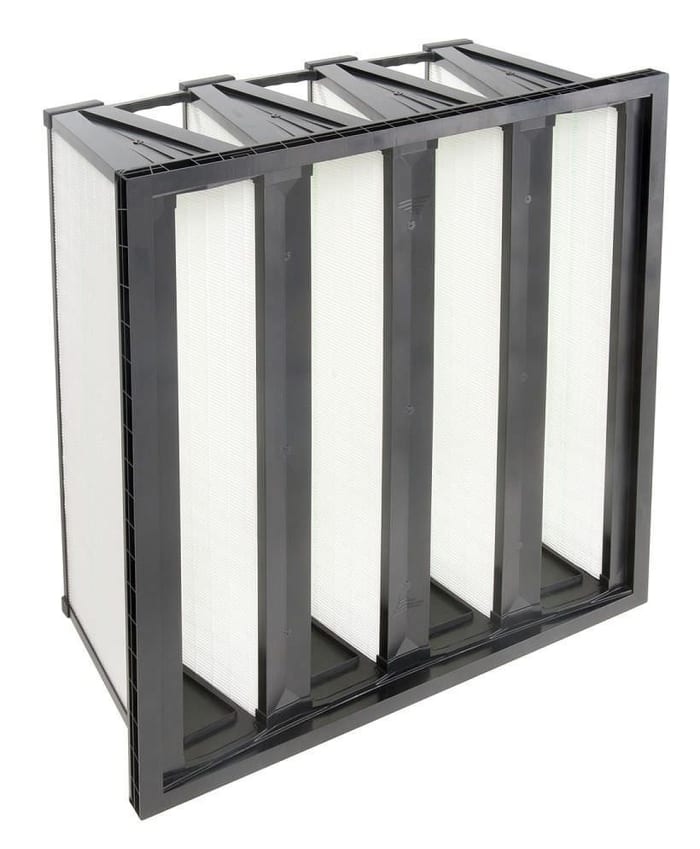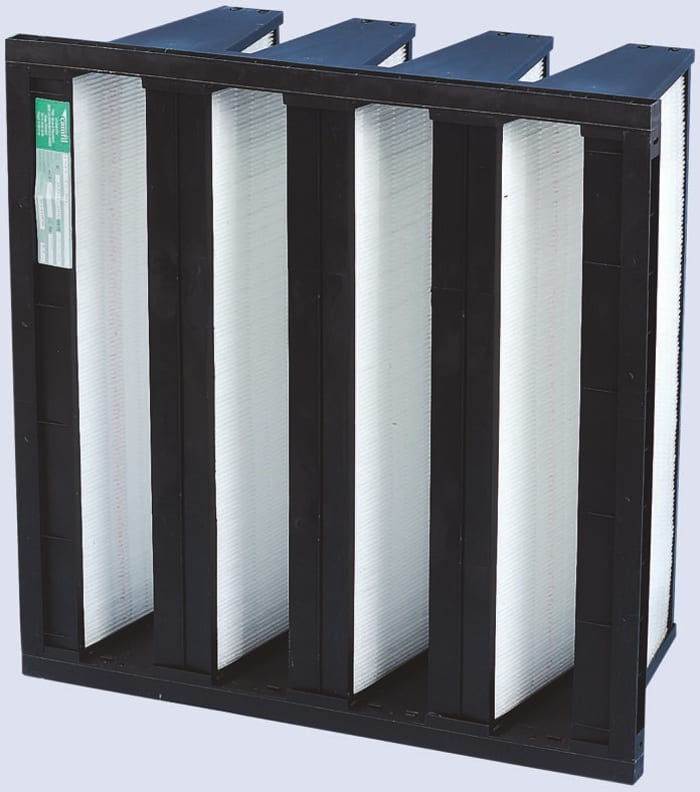RS PRO Glass Fibre Compact Rigid Bag Filter, F7 Grade, 13 MERV Rating, 592 x 592 x 292mm

Technical Document
Specifications
Brand
RS ProFilter Type
Compact Rigid Bag
Nominal Dimensions
24 x 24 x 12in
Actual Dimensions
592 x 592 x 292mm
Media Area
19m²
ISO 16890 Class
ISO-1-55
Filter MERV Rating
13
Number of Pockets
4
Filter Grade
F7
Maximum Air Flow
4250m³/h
Initial Pressure Drop
90Pa
Final Pressure Drop
450Pa
Colour
Black
Case Material
ABS
Media Material
Glass Fibre
Actual Depth
292mm
Header Size
25mm
Actual Width
592mm
Actual Height
592mm
Nominal Depth
12in
Nominal Height
24in
Nominal Dimensions Height x Width
24 x 24 in, 24 x 24 x 12 in
Nominal Width
24in
Country of Origin
United Kingdom
Product details
RS PRO High Efficiency Glass Fibre Rigid Filters
RS high efficiency glass fibre rigid minipleat filters in a compact configuration which can be retro-fitted for all grade F7 bag filters. These filters have a rigid plastic frame and are available with a 25 mm header. These glass fibre filters are fully incinerable. Glass fibre offers high strength whilst providing low weight, able to endure high temperatures whilst remaining stable making it ideal for HVAC applications and systems.
Features and Benefits:
• Glass fibre media
• F7 grade
• Fully incinerable
• Compact and rigid design
• Available in varying sizes
How do air filters work?
Used in heating, ventilation and air conditioning, HVAC filters are generally made of gauze like material. This provides a small passage for air to flow through whilst also stopping larger particles. Standard air filters are designed with efficiency in filtration, as they collect debris and dust. Some more complex filters remove odours and feature a charcoal element. Preventing debris from entering a ventilation, cooling or heating system is vital in ensuring longevity as foreign objects in these types of systems can cause them to overheat and cease functioning.
Why change HVAC air filters?
If these types of filters are not properly attended to, they can become clogged. This can prevent air flow possibly causing the system to overheat and can eventually lead to equipment break down or fires. Changing air filters regularly is vital for health and safety and a HVAC systems longevity.


P.O.A.
1
P.O.A.
Stock information temporarily unavailable.
1
Stock information temporarily unavailable.


Technical Document
Specifications
Brand
RS ProFilter Type
Compact Rigid Bag
Nominal Dimensions
24 x 24 x 12in
Actual Dimensions
592 x 592 x 292mm
Media Area
19m²
ISO 16890 Class
ISO-1-55
Filter MERV Rating
13
Number of Pockets
4
Filter Grade
F7
Maximum Air Flow
4250m³/h
Initial Pressure Drop
90Pa
Final Pressure Drop
450Pa
Colour
Black
Case Material
ABS
Media Material
Glass Fibre
Actual Depth
292mm
Header Size
25mm
Actual Width
592mm
Actual Height
592mm
Nominal Depth
12in
Nominal Height
24in
Nominal Dimensions Height x Width
24 x 24 in, 24 x 24 x 12 in
Nominal Width
24in
Country of Origin
United Kingdom
Product details
RS PRO High Efficiency Glass Fibre Rigid Filters
RS high efficiency glass fibre rigid minipleat filters in a compact configuration which can be retro-fitted for all grade F7 bag filters. These filters have a rigid plastic frame and are available with a 25 mm header. These glass fibre filters are fully incinerable. Glass fibre offers high strength whilst providing low weight, able to endure high temperatures whilst remaining stable making it ideal for HVAC applications and systems.
Features and Benefits:
• Glass fibre media
• F7 grade
• Fully incinerable
• Compact and rigid design
• Available in varying sizes
How do air filters work?
Used in heating, ventilation and air conditioning, HVAC filters are generally made of gauze like material. This provides a small passage for air to flow through whilst also stopping larger particles. Standard air filters are designed with efficiency in filtration, as they collect debris and dust. Some more complex filters remove odours and feature a charcoal element. Preventing debris from entering a ventilation, cooling or heating system is vital in ensuring longevity as foreign objects in these types of systems can cause them to overheat and cease functioning.
Why change HVAC air filters?
If these types of filters are not properly attended to, they can become clogged. This can prevent air flow possibly causing the system to overheat and can eventually lead to equipment break down or fires. Changing air filters regularly is vital for health and safety and a HVAC systems longevity.



